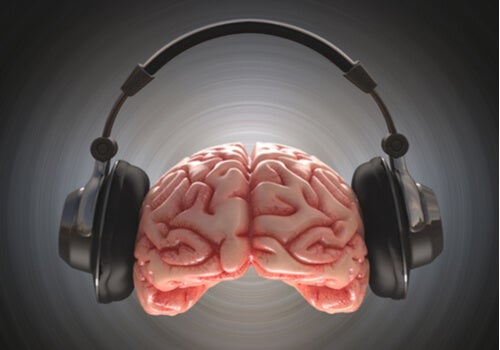Some people define binaural beats as the new ‘technological drug’. The objective of this auditory phenomenon is to create in the brain a sensation of three-dimensionality. The effect is achieved by generating two slightly different types of sound frequencies in each ear through headphones. Therefore, we end up perceiving a third sound, one that causes a series of sensations at the same time.
Calmness, well-being, tingling, sensory stimulation. The effects of this type of experience vary from one person to another. However, it’s clear that no one is indifferent to the process.
Binaural beats are all the rage, to the extent that binaural beat therapy has appeared. It’s an alternative approach to treating states of anxiety and stress.
Is there scientific support for binaural beats?
There are no conclusive studies to support the effectiveness of binaural beat therapy as it’s currently in the experimental phase. This doesn’t mean that there aren’t thousands of people who use this practice daily to relax, reduce insomnia, improve their concentration, or simply experience the pleasure of the sensation it creates in them.
The I-Doser website, which was created by a psychologist specializing in audio and music, defines binaural beats as something addictive that produces enormous pleasure. In fact, they define it as the new digital drug. Nevertheless, experts insist that, while they can improve mood, in some cases they work merely by suggestion.
Binaural beats, a phenomenon with a historical background
Binaural beats are based on the fact that the right and left ears receive a slightly different frequency tone. However, the brain perceives them as a single tone, a faster and remarkably pleasant one. Listening to a frequency of 120 Hertz (Hz) in one ear and 132 in the other would produce a 12 Hz binaural beat.
While this may seem new to us, it isn’t so for the world of science. In fact, in 1839, Heinrich Wilhelm Dove, a Prussian physicist, discovered this fact. He realized that the simple fact of hearing constant tones played at slightly different frequencies in each ear causes the individual to perceive a different sound. Dr. Dove defined this as a binaural beat.
Since then, this type of experience has been used experimentally in clinical settings. As a matter of fact, attempts have been made to see if binaural beats improve the quality of sleep and if it reduces, at the same time, feelings of anxiety. The results are rather variable. Over the decades, they’ve shown that there are those who find it works and those who are left completely indifferent.
Binaural beats to reduce anxiety or the sensation of physical pain
Some people make use of binaural beats with the idea of reducing their anxiety. Others, who suffer from pain due to injuries, joint problems, or even migraines also use this type of therapy.
In a study conducted by the Department of Behavioral Sciences of the National Distance Education University (Spain), Dr. Miguel García-Argibay and his colleagues found a medium degree of effectiveness.
They found that binaural beats were effective in only a limited number of patients. After two weeks with a listening time of 20 minutes, 26 percent of the sample reduced their level of anxiety and pain perception thanks to binaural beats.

Binaural beat therapy for insomnia
Research regarding binaural sounds applied to patients with insomnia problems is more significant. Studies such as one conducted by the University of Romania endorse its effectiveness in one specific aspect: it can help us to fall asleep earlier.
However, no conclusive data exists to support the fact that binaural beats help prevent frequent awakenings or promote a night of more restful and deep sleep. Once again there are differences. For example, there are those who’ve helped improve their quality of life with better sleep and others who show no improvement.
Relaxation and improvement in mood
Listening to binaural beats for ten minutes every day, at a frequency of 6 Hz, can improve your mood. They do this by generating in your brain a sensation similar to a meditation session. Therefore, you feel more relaxed, receptive to your environment, and with a sense of serenity and balance. This enhances your motivation and feelings of positivity.
Binaural beats and working memory
A study conducted by Jakub Kraus and Michaela Purubanova explored the effect of binaural beats on working memory capacity. They used a sample of 50 participants, who were separated into two groups. One group underwent binaural beat stimulation while listening to the sound of the sea. The other group listened only to the sound of the sea, without the stimulation of binaural beats.
During the investigation, working memory capacity was measured before and after stimulation. As the researchers expected, only the participants who were stimulated with binaural beats showed an improvement in working memory capacity.
In this case, they found that when binaural beats correspond to the alpha range of brain activity, there’s a temporary positive impact on working memory, increasing its capacity.
This outlines a series of interesting improvements. That said, as much of the research suggests, there’s a great deal of variability. Consequently, more work is needed to understand what changes binaural beats produce at the brain level to figure out why some people benefit so significantly from this type of therapy.
The fact that the data isn’t conclusive doesn’t mean it’s any less interesting. In fact, you can actually try the experience for yourself and find out what sensations binaural beats provoke in you. All you need is a set of good stereo headphones. Then, just press play on any of the videos on YouTube on the subject. It certainly won’t do you any harm to immerse yourself in this curious universe of sounds.
The post Binaural Beats: Are They Really Beneficial? appeared first on Exploring your mind.



















Comments